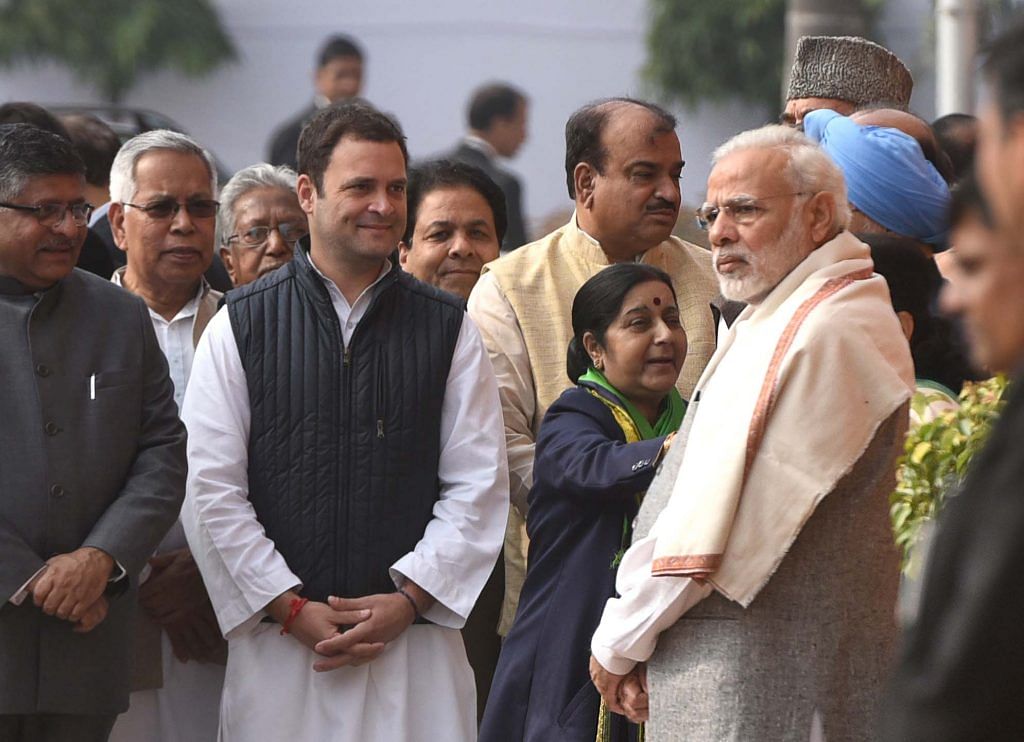The 2019 general election, seen through a conversation with strangers in a train.
In a train from Udaipur to Indore Friday, I had for company a retired bank manager from Mandsaur, his wife, who wasn’t too interested in politics but listened keenly to our conversation, and a young man in his early twenties who lived in Udaipur but travelled frequently to Ujjain and Indore for work. A credit risk analyst for a financial company, he travels to meet loan applicants in rural and suburban areas, assessing their creditworthiness.
The usual political notes were exchanged: They were both Bharatiya Janata Party (BJP) voters and Modi supporters but expected the party to lose in Madhya Pradesh as well as Rajasthan. They were both relieved at the thought. In Rajasthan, Vasundhara had to be removed, and in Madhya Pradesh, the local BJP MLAs and workers.
But what about Modi? “Modi is OK,” said the young man. “Modi theek hai,” echoed the bank manager. Why do you like Modi, I asked, making a mental note of the change from “great” in 2014 to “OK” in 2018.
The credit risk analyst said, “Well if you compare him to Rahul…”
Me: “For a moment, don’t compare…”
“But we have to compare,” he said, “It’s like a multiple choice question (MCQ). There are only four options.”
“Let’s say this is not an MCQ. This is an essay. Evaluate Modi’s performance. What has he achieved?”I asked.
He paused for a moment, and then said, “Well, he’s been really bad with the economy. Notebandi was his worst decision. We have still not recovered from the slowdown caused by it.”
I had asked for achievement, I got failure.
“So why do you say Modi is OK?” I probed further.
Also Read: What do Modi haters say when confronted with the TINA factor?
‘Magic with words’
“See, he has increased India’s stature before the world,” the analyst replied, “By going to every country, he made the world respect Indians. I have relatives abroad and they tell me how they are called brownies and all, but Modi has made them feel proud.
“Wherever he goes, he meets NRIs… I feel happy he’s reaching out to NRIs. It shows he cares about Indians everywhere.”
“Yes, but has Modi improved relations with other countries?” I began to count his foreign policy failures and flip-flops.
“Yes, yes,” the young man agreed, to my surprise. “He’s been terrible at foreign policy too.”
“So then why is he OK?”
“See, he is a very smart politician who always defeats the enemy,” he said, “As in chess, your purpose is to defeat the enemy…”
“But that may not be a great thing in politics. Democracy needs an opposition,” I said.
“Yes, but I like it that Modi is a smart politician. People tend to appreciate smart people.”
I said I thought people liked Modi mainly because he was a good orator. They both agreed. “Bol bol ke ghumata rehta hai (He keeps people enthralled with his words),” said the bank manager. His reticent wife added, “Uske munh se jadoo nikalta hai (Magic comes out of his mouth).”
“He speaks like a mature person, not like Rahul Gandhi…” said the credit risk analyst.
“So none of you can count many of Modi’s achievements, but will still vote for Modi?” I asked.
“Wohi baat hai na,” the credit risk analyst returned to his MCQs, “Aur hai kaun? This Rahul Gandhi… (That’s what I’m saying. Who’s the alternative? Not Rahul Gandhi).”
After Nehru, who?
“Why is it so important to know who the next PM will be?” I asked.
“During Indira Gandhi’s time, there used to be a question: After Indira, who?”
I corrected him. The question was asked of Nehru. And by the way, India did just fine after Nehru, democracy survived, and we didn’t slip into some anarchy or dictatorship, as some feared.
He didn’t buy the argument. So I asked, “Who do you think would make a better PM than Modi?”
“Yeh toh sochna padega (I will have to think about it). I could tell you in a day…”
The young man was open to changing his political preferences, he explained, having wasted some time as an AAP volunteer in Udaipur. If only there were a better option than Modi…
What do you think of Raghuram Rajan, I asked. “He is brilliant,” the young man said. “First class,” said the bank manager.
“The current RBI governor,” the young man said, unable to even recall Urjit Patel’s name, “is not even fit to be Raghuram Rajan’s servant.”
“So let me get this right,” I said, wanting clarity. “If Raghuram Rajan were to be the Congress party’s PM candidate, you would both be happy to press the hand symbol on the EVM, instead of the lotus?”
“Absolutely,” the young man replied. “Bilkul,” added the retired bank manager.
But that was not going to happen, they said.
“What about Priyanka Gandhi?” I asked.
“She’ll be good,” the young man said.
‘Dadi pe gayi hai’
“Bohot tez hai (She is very sharp),” the retired bank manager replied. “Modi tik nahi payega Priyanka ke samnay (Modi wouldn’t be able to hold his own against her).”
“Dadi pe gayi hai (She has taken after her grandmother, Indira),” said the bank manager’s wife.
For all the complicated analysis of the pundits in Delhi, this is the earthy wisdom of the ordinary voter. They’re ready to say goodbye to Modi, but not for Rahul Gandhi.
The opposition can try and make it an un-presdential election, but it is unlikely that they can prevent the voter from asking: After Modi, who?
Also Read: Indian intellectuals hate Rahul Gandhi as much as they hate Narendra Modi
